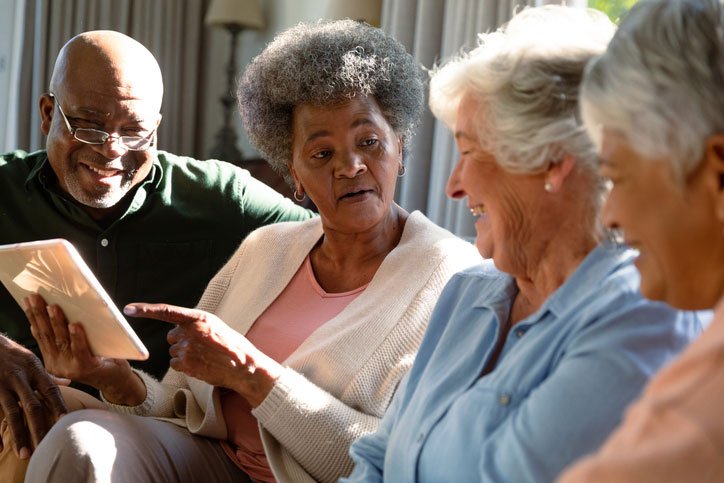
A church elder is a person who has spiritual authority in the church. In simplest terms, a church elder is a long-time church member, typically older, who is there to offer guidance and mentorship for fellow members of a congregation.
But the title of elder isn’t given to someone simply because they are older and been there longer than most other congregants. Instead, it is a biblically based qualification. The term “elder” is rooted in the Bible (the Greek word presbýteros), with Acts alone mentioning it about 20 times. The title of elder in the New Testament refers to leaders and rulers of a community or heads of households. The Christian church followed the Jewish tradition of appointing more mature men of wisdom as church elders. Depending on the translation, elder is often labeled an “overseer” in the Bible, although we can assume it refers to the same role.
The New Testament gives us many examples of the important role elders should play in the church and how those in the church should regard them:
- Peter, who committed his life to shepherding the flock, shares this mission with the elders of local churches:“Shepherd the flock of God that is among you, exercising oversight, not under compulsion, but willingly, as God would have you; not for shameful gain, but eagerly; not domineering over those in your charge, but being examples to the flock” (1 Peter 5:2). ~ ESV
- Paul asks Titus to “put what remained into order, and appoint elders in every town” (Titus 1:5). ~ ESV
- Paul affirmed their importance in the church: “Let the elders who rule well be considered worthy of double honor, especially those who labor in preaching and teaching” (1 Timothy 5:17). ~ ESV
- Referring to a list of practical instructions for practical living: “Obey your leaders and submit to them, for they are keeping watch over your souls, as those who will have to give an account” (Hebrews 13:17). ~ ESV
Explore a Christian Ministry Degree – Request More Info Today!
What Does it Take to Become a Church Elder?
Personality Profile and Characteristics of a Church Elder
 What traits and qualities do church elders possess?
What traits and qualities do church elders possess?
Elders, as described in the Bible, must be men of virtue and above reproach and must be fully prepared to take on such an honorable role. It’s a long-term commitment that is often more about “who you are” rather than “what you do.” Qualifications for the role of a church elder are clearly defined in the New Testament.
1Timothy 3: 1-7 and Titus 1: 6-9 serve as the two, main New Testament passages where the Apostle Paul details the qualification of elders.
According to 1Timothy 3: 1-7, an elder must:
- Be faithful to his wife
- Live wisely
- Have self-control
- Be respectable (have a good reputation)
- Be hospitable (enjoy having guests in his home)
- Be able to teach
- Not be a heavy drinker
- Be gentle, not violent
- Not be quarrelsome
- Not love money
- Manage his own family well
- Be respected by his children (“For if a man cannot manage his own household, how can he take care of Gods church?” ~ NLT)
- Not be a new believer because his pride may make him fall
- Be spoken highly of by people outside of the church (“…so that he will not be disgraced and fall into the devil’s trap” ~ NLT)
1Timothy 3: 14-16 tells us that Apostle Paul gave these instructions so that the congregants will “know how people must conduct themselves in the household of God. This is the church of the living God, which is the pillar and foundation of the truth.” ~ NLT
The Role of the Church Elder
 The New Testament tells us that elders are called upon to teach and preach the doctrine of the church. Their role also extends to caring for the physical needs of their congregation: “Are any of you sick? You should call for the elders of the church to come and pray over you, anointing you with oil in the name of the Lord” (James 5:14). ~ NLT
The New Testament tells us that elders are called upon to teach and preach the doctrine of the church. Their role also extends to caring for the physical needs of their congregation: “Are any of you sick? You should call for the elders of the church to come and pray over you, anointing you with oil in the name of the Lord” (James 5:14). ~ NLT
Although the exact role of a church elder ultimately depends on the denomination or the specific needs of the church, it’s always a respected and revered title. Just some of the roles assumed by church elders include:
- Pastoring
- Mentoring
- Preaching
- Teaching
- Supporting
- Disciplining
- Encouraging
- Delegating
Church elders today may perform financial, organizational, or spiritual duties. Some perform liturgical duties, while others serve in a teaching capacity. Still others provide administrative tasks and assist the ordained clergy. It’s common for church elders to assume an officer or board member position within the church and, in some denominations, such as the Presbyterian denomination, they are elected officials.
The following examples provide insight into how different denominations view elders and what it takes to become one:
Presbyterian Church
Elders in the Presbyterian Church (USA) are responsible for strengthening the nurturing the faith and life of the congregation. The Book of Order instructs elders to engage in evangelism, pastoral care, worship, education, and stewardship. They lead by example and should be able to interpret and support the church’s vision. According to the Book of Order, they should exercise leadership, government, and discipline.
Elders in the Presbyterian Church are elected members who are ordained to serve a particular congregation. Members of a church session are referred to as “ruling elders,” while ministers are referred to as “teaching elders.” They serve a three-year term during which they are encouraged to work in more than one area of the church to learn and grow during their time of service.
Methodist Church
Elders in the Methodist Church are ordained clergy and can perform all of the duties within the church. They have a fourfold ministry of Word, Sacrament, Order, and Service. This means they are:
- Authorized to preach and teach the Word of God
- Provide pastoral care and counseling
- Administer the sacraments
- Serve as pastors, superintendents, and bishops
Both elders and pastors oversee congregations in the Methodist Church.
Elders attend seminary and earn a Master of Divinity (MDiv). They are assigned and appointed by the Bishop. Pastors in the Methodist Church receive more localized training and are limited to performing the sacraments on members within their local church. An elder, on the other hand, is ordained and can therefore administer the sacraments to anyone, anywhere in the world. In short, all elders are pastors, but not all pastors are elders.
Seventh-day Adventist Church
Elders in the Seventh-day Adventist Church work alongside SDA-ordained Ministers of the Gospel.
Elders in the SDA Church are responsible for:
- Visiting members of the parish and providing prayer and encouragement
- Leading worship services
- Preaching when the minister/pastor is not available
- Serving as a spiritual mentor
- Making a positive contribution to the church by participating in decision-making in the church and ministry; elders often serve as advisors in various church committees and projects.
Reformed Church in America
Elders in the Reformed Church in America are responsible for the oversight of the congregation. Duties include guiding and teaching the congregation, welcoming new members, admitting children to the Lord’s table, hearing confessions of faith, and acting on requests for infant baptism. Elders often help members of the church grow in their faith and make regular home, hospital, and nursing home visits. They often work closely with the pastor and provide the pastor with counsel, encouragement, and kind words.
In the Reformed Church in America, a commissioned pastor is also an elder who has been commissioned to fulfill a particular ministry need.









